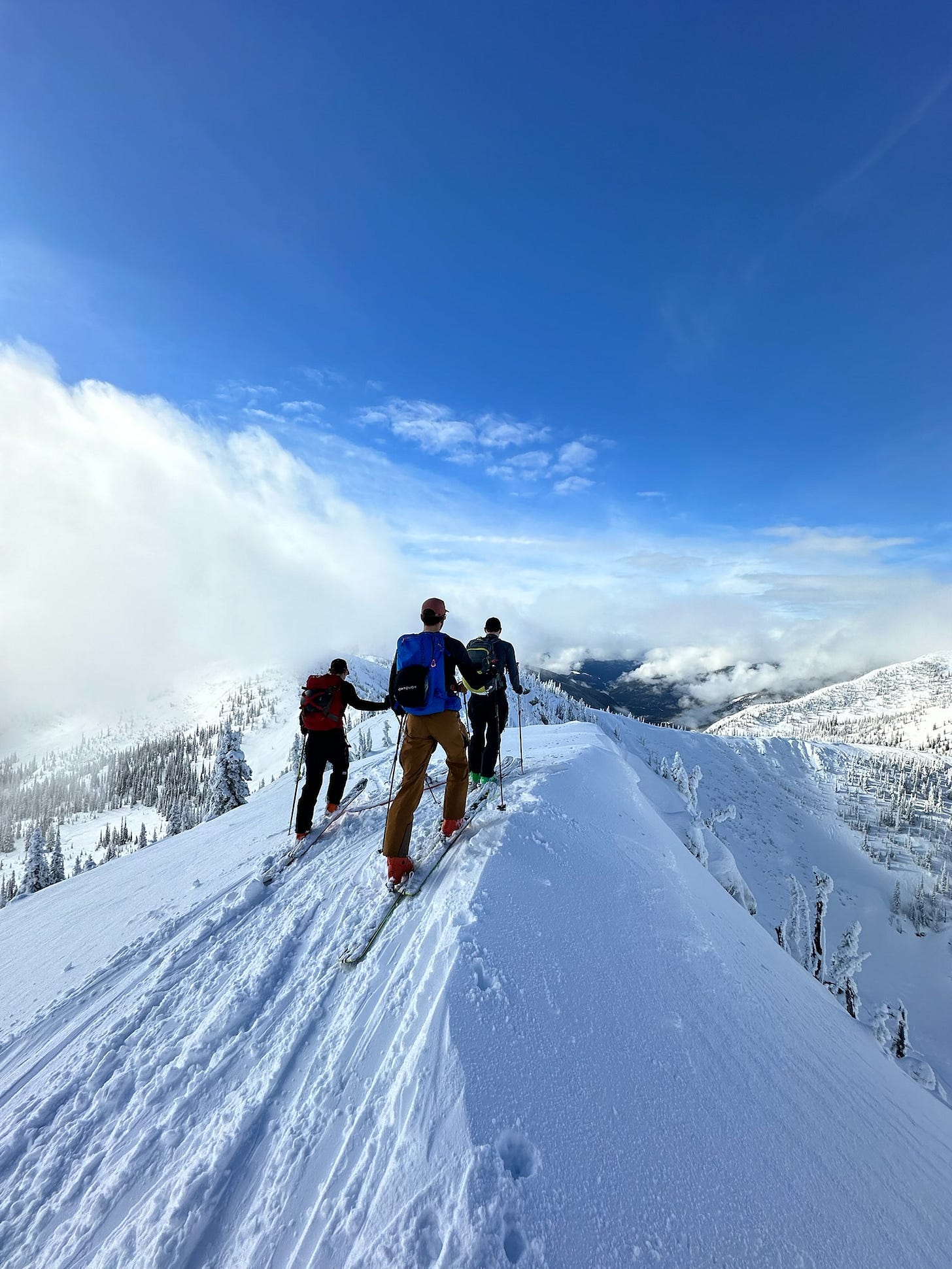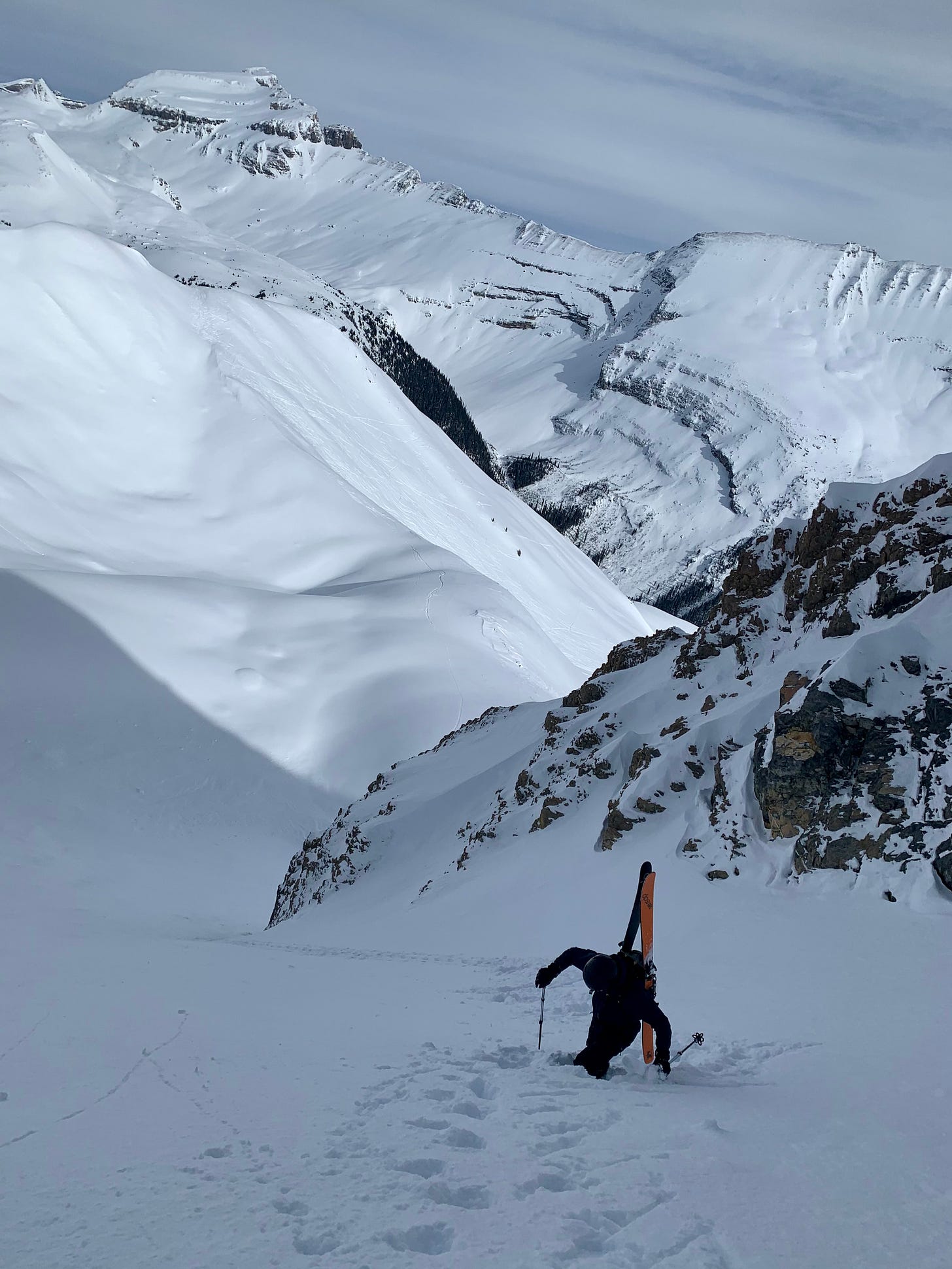Lessons from the backcountry
Challenge, risk, focus, connection
As the winter season approaches my mind has been wandering to the Rockies. The vast, beautiful, snow covered mountains that snake their way up through BC and Alberta.
I’ve spent a considerable amount of time (for a normal member of society - the Quebecois ski bums would scoff) in the backcountry putting animal hair skins onto the bottom of my skis, strapping on a 20 pound backpack, and walking 8 hours up a mountain in -25 degree temperatures. Why? I haven’t figured out exactly which screw in my brain is loose, but, being hours away from any other humans in a pristine mountain landscape, with clear blue skies and untouched champagne powder at a 37-degree angle as far as the eyes can see? It doesn’t get much better than that.
As I’m realizing is the case with most of life’s pursuits, my time in the backcountry has taught me a lot about the world. Things most of us know, but often forget.
Embracing challenge
The modern world is set up for you to endure the least amount of pain possible. You have all your needs met - food, water, shelter. I think there’s something to be said about people engaging in meaningful challenges, doing things that are hard. Running marathons, doing Ironmans, getting up early, working around the clock on something important, having hard conversations. Looking at a ski resort and thinking “why wouldn’t I just pay to take the chair up? It’s way faster and easier and the skiing is still fine.” is missing the point of life. The metaphorical ski down is only as rewarding as the walk up. Doing hard things is hard - that’s what makes them meaningful and rewarding. Don’t shy away from challenge, and don’t just choose the easiest option that society has to offer. Embrace meaningful challenges and know that they will lead to a meaningful life.
Managing risk
Backcountry skiing is “risky”. There is risk involved in everything you do, from the icy highway that takes you there to the cornice hanging off the ridge above you to the unstable snowpack beneath your feet that could trigger an avalanche (this is the main one people seem to fixate on - I see this as the equivalent of shark attacks for surfers; nowhere near the most dangerous part, but by far the scariest and most thought about.)
You can easily tell someone’s risk tolerance based on what they do for fun, and you can tell someone’s understanding of risk based on how many times they’ve been to a casino in the last year. Something to note about risk is that risk itself is not inherently good or bad. I’ve been guilty of being incredibly risk-averse throughout my life. I would over analyze every decision and not do anything that carried the risk of me failing. In my opinion, this is a limiting perspective. Risk is complex and our brains are bad at evaluating risk, which makes it hard to navigate in the real world. It can be helpful to understand the risk/reward profile of any given activity and then decide if it makes sense for you to take on. As you get feedback (ie. a risk you took resulted in something negative or positive) your understanding of your personal risk-tolerance will become clearer. If the risk you’re taking carries a significant chance of death or complete loss, then carefully consider if the reward is worth it to you. While skiing in the backcountry, there are often situations where the shortest path up a mountain or the best line down a mountain involve catastrophic risks - ie. if something out of your control were to go wrong, you could be seriously injured or die. This is why we often choose the longer route up or the slightly less fun line down, and enjoy a cold beer at the bottom.
Finding focus in your pursuits
Find a few things you really love doing and take them to the limits. There are infinite hobbies or activities to do. People will ask to join their soccer team or to come golfing with them or to join a book club. When you’re young it makes sense to try many things (and I imagine it also makes sense to continue experimenting and exploring throughout life) but put some effort into finding what you really love doing, not necessarily what everyone around you enjoys doing. Focus on your things. Spend your free time doing them. Find other people who also love doing them. Go deep, and try to find the limits of those things. Similar to an investment, time spent will compound and you’ll start experiencing outsized returns - one good day in the backcountry can yield the same joy as an entire season at the resort. This is only possible because of time and dedication towards pursuing that activity. You earn the right to reap the reward by committing to something, focusing on it, and taking it beyond the basics.
Disconnecting
We are so, so connected. Always up to date on the latest news, always seeing what our friends and that random guy we went to university with is doing, always checking the stock price, always replying to our Slack messages. On the one hand, it’s fine. This is the world we live in. Meditate, read for a bit, go for a walk, keep working, whatever you personally have to do to find some balance. On the other hand, I strongly believe we need a factory reset every once in a while. Get off grid for a while. No phone. No laptop. No internet. No news. Just good friends, doing something you love in the real world for 24 hours a day. Experience the slowness. The stillness. The sun rising and setting. Experience how the food tastes better. The coffee is stronger. The Kokanee’s are colder. Do something fully. Don’t film it, don’t think about something else, don’t worry about how you’re doing it. Just do the thing, fully. Be present doing something you love. This is the ultimate form of meditation.
Is any of this novel information? Certainly not. Does it serve as a useful reminder that the world is a beautiful, complex, and meaning-filled place that is yours to discover? For me, yes it does.







Really enjoyed this brother. The line below was one of my favorites. Great to see you back on the page. ❤️
“.You can easily tell someone’s risk tolerance based on what they do for fun, and you can tell someone’s understanding of risk based on how many times they’ve been to a casino in the last year.”